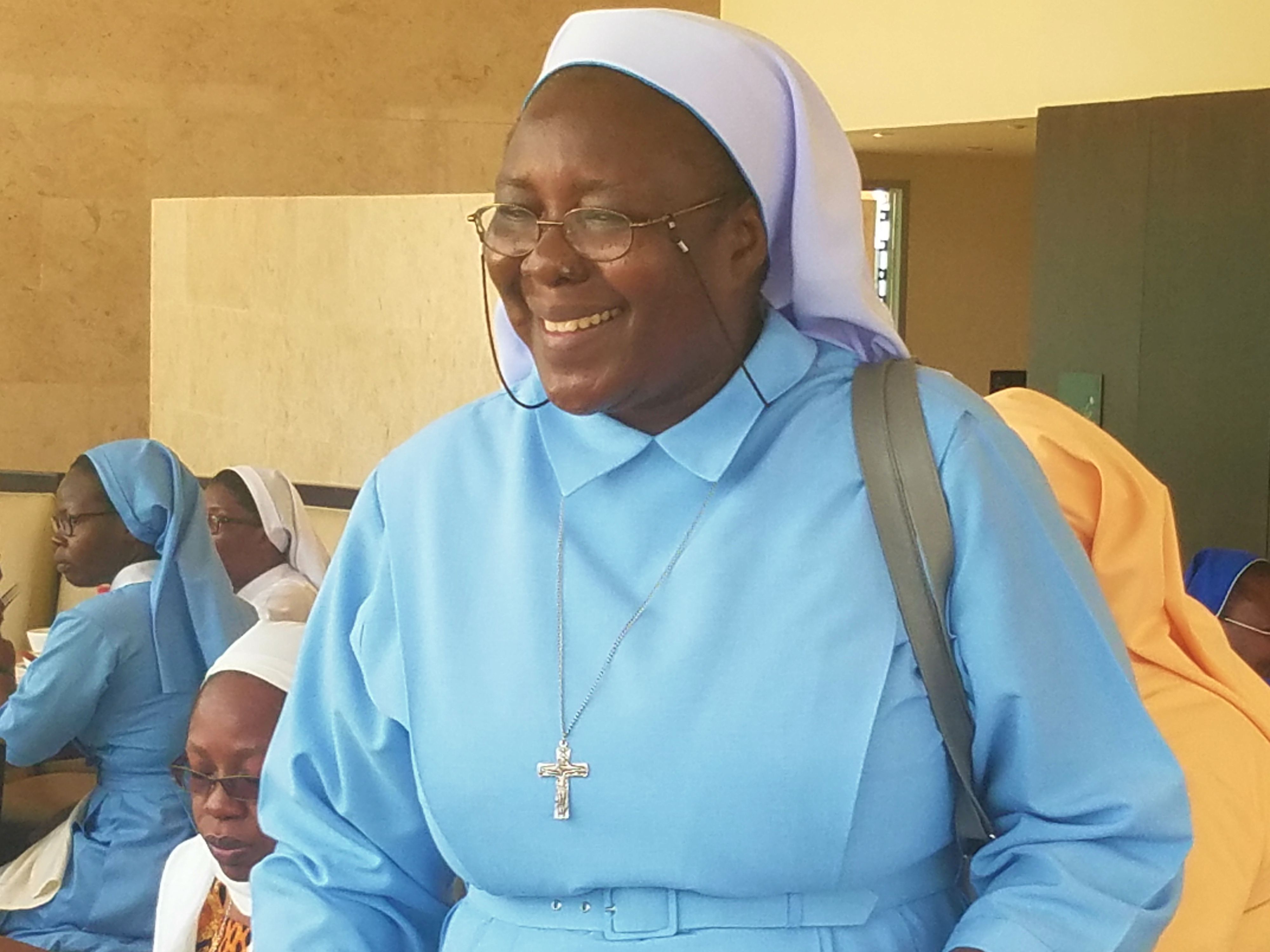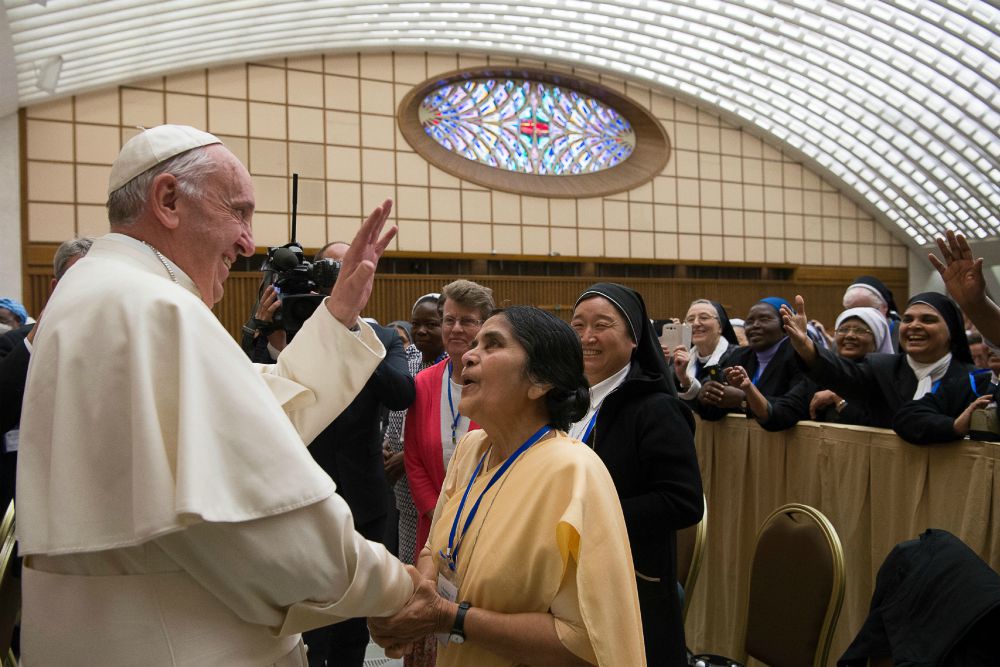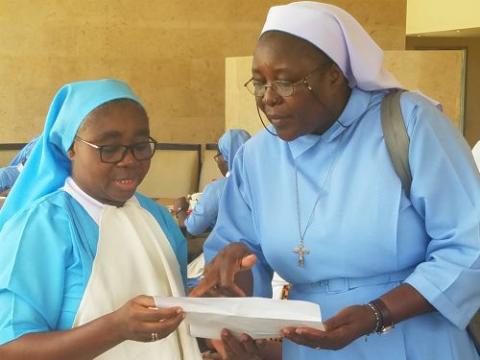
Sr. Draru Mary Cecilia of the Little Sisters of Mary Immaculate of Gulu in northern Uganda is the executive director of the African Sisters Education Collaborative. She is shown here during a December 2018 convening of the Conrad N. Hilton Foundation near Kampala, Uganda. (GSR photo/Chris Herlinger)
Sr. Draru Mary Cecilia, a member of the Little Sisters of Mary Immaculate of Gulu in northern Uganda, is the executive director of the African Sisters Education Collaborative, or ASEC, a position she has held since 2017. ASEC and Draru are based in Scranton, Pennsylvania, though Draru travels frequently.
A cornerstone of ASEC's work is delivering "educational programs that strengthen the capacity of women religious in Africa" and enable them to better minister to those they serve. In all of what ASEC does, the collaborative is aware that sisters "are the 'social face' of the Catholic Church in our society today," Draru said. "The sisters serve to people in most marginalized areas, where services are most needed." In accompanying communities, education is needed "to sustain that service. It's a mission of presence."
The need for educating sisters in Africa is considerable: There are an estimated 40,000 sisters in the 10 sub-Saharan countries in Africa where ASEC works, and 80% have no higher-education credentials, ASEC said.
The two largest ASEC programs, the Sisters Leadership Development Initiative, or SLDI, and the Higher Education for Sisters in Africa, or HESA, are funded by the Conrad N. Hilton Foundation, which also funds Global Sisters Report.
The SLDI program provides leadership and technology training to sisters in Africa over a three-year period through one-month-long workshops. Sisters take a basic technology track during the first year; in the second and third years, they specialize in either finance or administrative tracks.
The HESA program provides opportunities for women religious in 10 African countries to study at either the undergraduate or graduate level and acquire the academic qualifications required for ministries of specialized service to their communities. In the first year, sisters participate in an online program with an ASEC partner university in the United States. In the second year, the sisters complete their degrees at an on-site university in Africa partnering with ASEC.
Two other programs round out ASEC's initiatives. One is a two-year scholarship program for sisters in Tanzania, Malawi and Zambia who did not complete their high school or college education prior to joining religious life. The program is meant to bridge an "education gap" for sisters seeking to pursue higher education and who need accreditation. The fourth ASEC initiative is a service-learning program for students of ASEC's partner universities in the United States: Marywood University, Chestnut Hill College, Rosemont College and Neumann University. This program allows students from those Pennsylvania-based universities to serve in Africa to gain service experience while receiving academic credit.
Prior to relocating to the United States, Draru served in several positions at Uganda's Martyrs University, including that of dean of students. Draru received her doctorate from Radboud University in Nijmegen, the Netherlands. Her academic study focused on education, gender, African feminism and sustainable development in Africa.
GSR: There is a very practical reason for sisters to become better educated, isn't there?
Draru: Yes. In Africa, many sisters work with government and private institutions like hospitals, health centers, schools and colleges. Governments are requiring more and more academic credentials for those in service. So the sisters need that education for their work. Beyond that, societies expect much from sisters, so there is a need for sisters to become better educated and multi-skilled to be professionally prepared. Jobs are requiring more professionalism, and there is a need for training to update knowledge and skills.
The deeper question goes beyond credentials. It has to do with service for the people of God. For sisters, education is a means to improving their service, for improving the lives of people. For the sisters, the reference is always about service: How does education translate into service to people? A sister will always ask, "How does my high academic qualification help me to be an authentic witness to Christ among the people I serve? How best can I sustain the ministry to offer so much needed service to the people?"
Advertisement
Let's talk about the wider issues of Africa and what the continent faces in terms of education.
When we deal with Africa, we're dealing with a spirit of life, something that is expressed on the ground at the grassroots, a society where "we" is expressed more than "I," a place where people define themselves more in a communal way rather than in an individual way. So it's necessary as educators that ASEC works collaboratively. ASEC can't and doesn't come in Africa as a donor or expert, but as a partner. Of course, congregations by their religious nature have to work collaboratively, so ASEC's work is to bring different institutions together.
The HESA program brings student sisters from different countries and congregations to meet and interact with professors in the United States and with each other. This is a beautiful experience that the sisters appreciate a lot. One of the sisters studying online remarked, "I wish it could all be online!" That is one example of how sisters have appreciated the beauty of diversity of students and faculty.
There are challenges with building trust online: We have to get over the idea that online education is not as good as education requiring residencies. But online programs, especially those with connected to legitimate universities, offer great potential.
Of course, online courses require a lot of discipline: You're alone and are obligated to build up a lot of internal energy with an online program. But the learning can be rich, and the discipline required means that online students can even be ahead of those enrolled in more traditional settings.
"Nobody has it all. Nobody has all of the expertise, skills and knowledge required to transform society."
—Sr. Draru Mary Cecilia
That theme of collaboration — between congregations, between sisters and those they serve — seems to be very important to you.
ASEC's history is all about collaboration. ASEC began in 1999 as a collaboration of four congregations of women religious and their educational institutions of those congregations, so it's a part of ASEC's set of values to collaborate.
Collaboration is also a core value at ASEC because nobody has it all. Nobody has all of the expertise, skills and knowledge required to transform society. When groups work collaboratively, it brings in different skills and initiatives. It's rich. But it's also a fact that at the moment, collaboration is really the way to go. In Africa, collaboration is more explicit in the culture, but it also fits in with cultures of other parts of the world now. It's recognizing that we are not standalones. We are a people in the world who are in communion with each other.
There is a saying in Africa: "If you go alone, you can go fast. But if you go with a team, you go far." ASEC wants to go far and therefore takes the collaborative path.
You placed great importance in the May plenary of the International Union of Superiors General, or UISG. Tell us about that experience.
At the UISG conference, I saw collaboration at its best, as the theme invited each congregation and each sister to be a seed of prophetic hope in the church and the society today. It was beautiful to see leaders of congregations of women religious from a diversity of charisms, spiritualities, mission backgrounds and national contexts speaking in one voice on several issues and cultivating and nurturing hope in every situation.
It became even more powerful a presence when we had a prayerful audience with Pope Francis as purely women religious of the Catholic Church, united prayerfully with him in our own right. This for me was very powerful, a sign of our prophetic presence that planted a seed of hope in the heart of the church. The simplicity of the Holy Father, who decided to engage with us in a question-and-answer session instead of reading to us a prepared text, was a living testimony of the family spirit of our Catholic faith, where each and every faithful has a space to be that true child of God. This audience was special.

Pope Francis greets a nun during an audience with the heads of women's religious orders in Paul VI hall at the Vatican May 12. During a question-and-answer session with members of the UISG, the pope said he was willing to establish a commission to study whether women could serve as deacons. (CNS /L'Osservatore Romano)

Sr. Draru Mary Cecilia with another participant during a December 2018 convening of the Conrad N. Hilton Foundation near Kampala, Uganda. (GSR photo/Chris Herlinger)
Your spirituality: How would you define it and place in a greater context?
My own congregation's tradition is contemplative spirituality. We are constantly reflecting on what we do, and that extra eye is important to me. But it is bound up with our charism to bring the love of Jesus Christ to the most vulnerable. In my life, I try to bring that all together: that deep reflection based on my context, how to connect to people in the society in the light of God but always asking the question, "What is the need now? What direction is God pointing me to?" All of this is derived, of course, from the gift of the Holy Spirit to each individual sister and each congregation.
Everything you do and experience has a deeper message. When you look at the death of the sister who was killed in the Central Africa Republic [77-year-old French-Spanish Sr. Ines Nieves Sancho], the life of this sister is, humanly speaking, a loss. But in the world of missions, Sister Ines is a martyr. The life of Sister will be a seed for peace in that land if we reflect deeply on why she had to give up her life for the people in the Central African Republic when she had a possibility to work in a more peaceful environment.
This is the core of our Catholic faith and a response to the Gospel call "to give up your life for others." What's important now for the sisters who work in that area is to continue the work that Ines gave her life for. Her life and death are like a beacon of the will of God, and contemplation helps us read and correctly interpret the message God is communicating through the martyrdom of Sister Ines in the Central African Republic.
[Chris Herlinger is GSR international correspondent. His email address is cherlinger@ncronline.org.]







